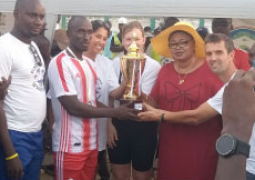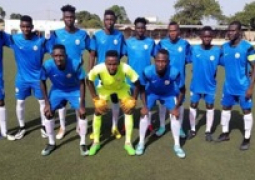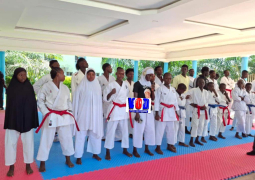Ebrima, 20, travelled irregularly and dangerously to Italy through war-torn Libya and the Mediterranean Sea. Despite the danger of the journey, stories like his have kindled the attention of many young players in The Gambia.
However, because of public sensitisations on the dangers of such journey and how unlikely it is to be another Ebrima in Italy, a lot of young people have given up on that route.
This has offered and widened the opportunity for human traffickers claiming to be intermediaries or agents of foreign football clubs to lure young sportsmen and women on the guise of taking them to foreign countries legally to further their sporting career.
Modou Lamin Beyai, a football agent, said so-called football agents take advantage of stories like that of Ebrima to lure young people who see a professional career in sports in a foreign land as a way out of poverty and a way to financially assist their families.
“The dream of playing in a foreign league with all the benefits and fame that comes with such, makes young footballers easily exploitable by so-called agents,” said Beyai, who was once a journalist.
“Some time back when I was a journalist, there were three Gambian players, for confidentiality I can’t reveal their names, who were falsely given opportunity to play professional football in the Middle East by somebody who claimed to be a recruitment agent for certain clubs in there. But when these young boys got there, their passports were seized and they ended up as domestic workers.
“I was later contacted as a journalist to report on the plight of the boys and I subsequently contacted the Professional Footballers Association to help them out.”
The football agent said although FIFA and Union of European Football Associations (UEFA) have put strict measures for signing football players, there are still agents who target African players because of the poverty in sports in this part of the world.
In The Gambia, for example, most players are paid less than an equivalent of hundred dollars monthly. Those considered highly paid players earn about hundred and fifty dollars.
“The bad salary is what is forcing many young footballers to look for other means to become professional players and get better wages,” Beyai said.
The football agent affirmed that “trafficking has been happening in sports and is still happening”.
No record
The National Agency Against Trafficking in Person (NAATIP), the government agency established to tackle human trafficking in all forms in The Gambia, has said they do not have any records of trafficking in person through sports, but acknowledged that it could be happening.
Experts on human trafficking said in most cases, victims of trafficking do not report their cases to authorities for fear of stigmatization.
Like NAATIP, the Gambia Football Federation also does not have any record of trafficking in sports.
Babucarr Jobe, the federation’s director of competition, said GFF is working on organizing “massive sensitization” to create awareness about trafficking in sports and how sportsmen and women can avoid falling into the trap of so-called foreign club recruitment agents.
“Players belong to clubs not GFF but these clubs are affiliated to the GFF, therefore it is the collective responsibility of both the GFF and the clubs to protect the players at all times.”
Big clubs in The Gambia contacted for this story including Real De Banjul said they have no experience or record on trafficking in sports.
However, Brikama United are aware of the existence of the menace and club officials repeatedly sensitizes their playersabout human trafficking and the tricks of unscrupulous football agents.
Modou Lamin Nyassi, head coach of Brikama United, said: “Some footballers are aware of human trafficking but some are not, and that is why it is important for clubs to talk to their players about it so that they don’t fall victim of it.
“For us here at Brikama United, when agents approach our players, they [the players] come to me first to vet this agent before even the discussion gets to the club’s administration. We do this vetting to avoid our players becoming victims of trafficking.”
As data on trafficking in sports has been lacking, the scope of the problem is difficult to determine.
However, the problem has been recognised by some instruments and actors in the international community. For instance, international instruments such as the UN Convention on the Rights of the Child and the International Labour Organization’s conventions on child labour recognises the fundamental rights of children which speaks to the problem of human trafficking in sports.
The US Department of State (2020) annual report on trafficking in persons estimates that thousands of migrant athletes are victims of human trafficking in football every year.
This was the first time that this phenomenon was highlighted in detail within the report and it was listed as one of seven topical issues.
Each year, approximately 15,000 young individuals are trafficked from West Africa into Europe to play football, according to an August 2021 report published by University of Nottingham Rights Lab.





